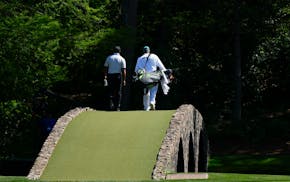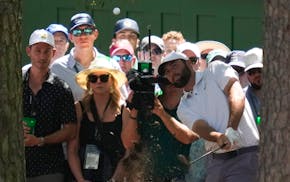Donovan McNabb's arrival provides a reminder that trades are, and should be, about timing and value, not name recognition and emotion.
McNabb is a 35-year-old quarterback coming off his worst season. With the Redskins, he had his conditioning and savvy questioned by a coach, Mike Shanahan, who earned the reputation of quarterback guru by coaxing John Elway's best seasons from him at ages 37 and 38.
Those excited by McNabb's name recognition think the Vikings hit a home run. Those who watched McNabb throw Frisbees for the Redskins last year think the Vikings have foolishly invested in a washed-up star. Both views are probably too dramatic.
Move past the emotional response attached to McNabb's name, and what the Vikings have here is a logical acquisition of an undervalued player.
The team traded a pair of sixth-round draft picks for a starting quarterback who will allow Christian Ponder time to acclimate to the NFL. There is nothing particularly exciting about this; there is also nothing wrong with it.
But then most people react to what is in a name rather than what matters most, which is the timing and terms of the deal. Suggest that the Twins, with no guarantees that they can re-sign him, should deal Michael Cuddyer before he becomes a free agent, and fans react like you've traded the family dog for a hamster to be named later.
The Vikings and Twins have one thing in common, other than gut-wrenching postseason failures: Both franchises have remained remarkably competitive even while turning over their rosters. The Twins have dominated their division and the Vikings built what might have been the best roster in football in 2009.
Given that neither franchise possessed any natural advantages until the Twins moved to Target Field last season, we should recognize that both front offices are highly competent, if fallible.
What we learn by dissecting their most important moves is that timing and value are the keys to a good deal.
The Twins' biggest mistake of recent vintage was trading Johan Santana to the Mets for a lousy group of prospects. They were right to trade him, but their timing was awful. They dealt with the Mets during the winter just after the Yankees and Red Sox had backed away. They lacked leverage. The lesson learned: They should have backed away, too, and waited until the spring or midseason for the market to improve.
The Vikings' signed Brett Favre before the 2009 season, then re-signed him before the 2010 season. The decision looked brilliant in '09 and less so in '10, but, in fact, both were logical moves, acquiring a Hall of Fame quarterback without having to give up value in a trade.
The Twins have reason to regret the $184 million contract they gave to Joe Mauer. The Twins knew the risks when they signed the 6-5 catcher to an eight-year deal, but Mauer had timing and name recognition inflating his value. If the Twins hadn't been entering a new publicly subsidized stadium in the wake of Mauer's MVP season, they never would have made this deal, but Mauer's agent used the timing and Mauer's name recognition to inflate his worth.
If the Twins' dealings in the trade market have proved anything, it is that trading a popular player at the height of his value -- the kind of move that enrages most fans -- is exactly the right idea.
If the Twins had traded Santana, Torii Hunter, Delmon Young and Francisco Liriano at the right time, their roster might have been deep enough for them to survive even their ridiculous spate of injuries this season.
McNabb makes sense for the Vikings not because of name recognition, but because of the deal's details. It is in the Twins' best interest to take similarly unsentimental views of their best, and most popular, players.
Jim Souhan can be heard Sundays from 10 a.m. to noon and weekdays at 2:40 p.m. on 1500ESPN.
His Twitter name is Souhanstrib. • jsouhan@startribune.com

Souhan: Why Tiger Woods should keep swinging
Souhan: Scheffler wins Masters again, shows what makes him special
Morikawa falters in final round at Masters

Keeping up with the Joneses who helped design Augusta National's classic back nine

